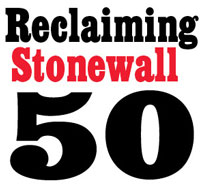It hasn’t turned out the way some of us had hoped. And maybe that’s OK. Or maybe no more than that is possible. Not in this country. Not at this time.
In the immediate aftermath of the Stonewall riots, the Gay Liberation Front was born. Its agenda was broad and transformative. It wanted more than to be allowed in, more than permission to join up. The Front offered instead a radical vision of social transformation. It demanded that we stop invading other countries under the guise of saving them. It insisted that we seriously address poverty and racism at home. It challenged traditional sexual and gender norms and rejected the view that the monogamous, male-dominated family unit was the most reliable path to a satisfying life. It scorned the right to join the military (to kill) and to sign up for state-sponsored marriage as unworthy primary goals for a social-justice movement. It refused, to paraphrase James Baldwin, to continue to plead for the right to rent a room in a house that was burning down.
The Gay Liberation Front didn’t last long. Americans have a short attention span and a limited tolerance for transformative politics. The “let us in”/”we’re just like you” folks soon took over the organized gay movement, quickly shrank its platform to centrist issues (the right to marry, etc.) and adopted an attitude attuned to placation and gratitude.
Does that mean nothing of value has been accomplished in the 50 years since Stonewall? Of course not. The past 50 years have seen a remarkable change in attitude toward sexual and gender minorities in the United States. From being denounced as sinners and criminals and all but universally pathologized and condemned—yes, even hunted—we’re now largely acknowledged as a respectable minority (even if profound homophobia remains alive and well in evangelical America, as in other communities). The overwhelming majority of gay people, like the rest of the country, has never rallied—or never for long—to a radical agenda. During periods of un-common economic hardship, like the Great Depression of the 1930s or the labor wars of the late 19th century, the left-wing ranks swelled. Yet once conditions improved, protest rapidly dissipated. The call for sweeping change in this country has never matched the sustaining power of the European left.
I suspect most LGBTQ people will celebrate Stonewall’s 50th anniversary with feelings of satisfaction with what is widely being hailed as the speediest success story in our country’s long history of social protest. The grumblers among us are a decided minority; we’re viewed by the gay majority as professional malcontents, perfectionist dreamers, unable to savor progress even when staring it in the face. It’s a view, doubtless, with some validity. But as some sage said long ago, “If you ask for a slice of the pie, you’ll get nothing. If you demand the whole pie, you’ll get a slice.” Viewed from that perspective, the argument holds that you cannot transform a culture by emulating its values and offering thanks for being allowed to share in them. The emphasis of today’s LGBTQ movement on cultural assimilation is inescapably based on the assumption—false in my view—that our mainstream institutions are structurally sound and morally acceptable.
It all depends on the wish list you start with. The current surge of progressivism, especially among the young, provides some hope that centrism—gay and straight—will cease to enchant the imprisoned multitude.



